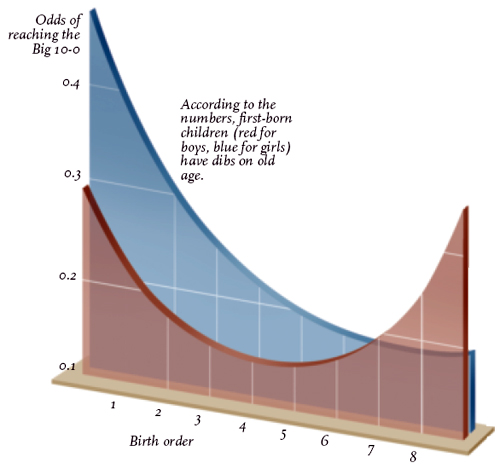New Media Coverage of Longevity Science
See also:
What is Aging? Theories of Aging Population Aging
Greetings,
I am pleased to share with you the new media coverage of our longevity studies published by the University of Chicago Magazine:
"Investigations: Fig. 1, Birthright"
The University of Chicago Magazine,
-- February 2006, volume 98, issue 3, page 20
http://magazine.uchicago.edu/0602/investigations/fig1.shtml
Comments and suggestions are welcome!
-------------------------------------------
The University of Chicago Magazine, 2006, 98 (3): 20
Investigations: Fig. 1, Birthright
It’s not just that centenarians are tougher than everybody else. Turns out they’ve got statistics on their side. According to a study by Leonid A. Gavrilov, PhD’98, and wife Natalia S. Gavrilova, SM’04, both researchers on aging at Chicago’s National Opinion Research Center, people raised on farms out West are more likely to live to 100 than urbanites back East.
October and November babies might expect to outlast those born between April and June. Up to age 110, men’s mortality outpaces women’s, and the life expectancies of both increase for those born of young parents less likely to have age-damaged sperm and eggs.
But the predictor that most struck researchers, who sifted through 75 million U.S. genealogical records to find centenarians born between 1875 and 1899, was birth order. First-born daughters were three times more likely to survive to 100 than their youngest sisters. Twice as many first-born sons reached 100 than boys born fourth or sixth. The odds rebounded, however, for sons born ninth or later. The study posits that younger siblings might suffer from diluted family resources, less parental attention, and their mothers’ “biological depletion.”

------------------------------
Comments and suggestions are welcome!
By the way, our best (most popular) webpages are:
Longevity Science:
Unraveling the Secrets of Human Longevity & Aging
Population Aging
Evolutionary Theories of Aging and Longevity
What is Aging? Aging - Disease Connection
Anti-Aging Publications
Media Coverage of Longevity Science
Classics of Longevity Studies
Statement of Research Interests
Invited Lectures on Longevity Science
References for "The Biology of Life Span" book
Russian Studies: Russian Health, Mortality and Lifespan
The Orgel's Error Catastrophe Theory of Aging and Longevity
Is Immortality Possible?
Useful Tools:

What is Aging? Theories of Aging Population Aging
Greetings,
I am pleased to share with you the new media coverage of our longevity studies published by the University of Chicago Magazine:
"Investigations: Fig. 1, Birthright"
The University of Chicago Magazine,
-- February 2006, volume 98, issue 3, page 20
http://magazine.uchicago.edu/0602/investigations/fig1.shtml
Comments and suggestions are welcome!
-------------------------------------------
The University of Chicago Magazine, 2006, 98 (3): 20
Investigations: Fig. 1, Birthright
It’s not just that centenarians are tougher than everybody else. Turns out they’ve got statistics on their side. According to a study by Leonid A. Gavrilov, PhD’98, and wife Natalia S. Gavrilova, SM’04, both researchers on aging at Chicago’s National Opinion Research Center, people raised on farms out West are more likely to live to 100 than urbanites back East.
October and November babies might expect to outlast those born between April and June. Up to age 110, men’s mortality outpaces women’s, and the life expectancies of both increase for those born of young parents less likely to have age-damaged sperm and eggs.
But the predictor that most struck researchers, who sifted through 75 million U.S. genealogical records to find centenarians born between 1875 and 1899, was birth order. First-born daughters were three times more likely to survive to 100 than their youngest sisters. Twice as many first-born sons reached 100 than boys born fourth or sixth. The odds rebounded, however, for sons born ninth or later. The study posits that younger siblings might suffer from diluted family resources, less parental attention, and their mothers’ “biological depletion.”

------------------------------
Comments and suggestions are welcome!
By the way, our best (most popular) webpages are:
Longevity Science:
Unraveling the Secrets of Human Longevity & Aging
Population Aging
Evolutionary Theories of Aging and Longevity
What is Aging? Aging - Disease Connection
Anti-Aging Publications
Media Coverage of Longevity Science
Classics of Longevity Studies
Statement of Research Interests
Invited Lectures on Longevity Science
References for "The Biology of Life Span" book
Russian Studies: Russian Health, Mortality and Lifespan
The Orgel's Error Catastrophe Theory of Aging and Longevity
Is Immortality Possible?
Useful Tools:


